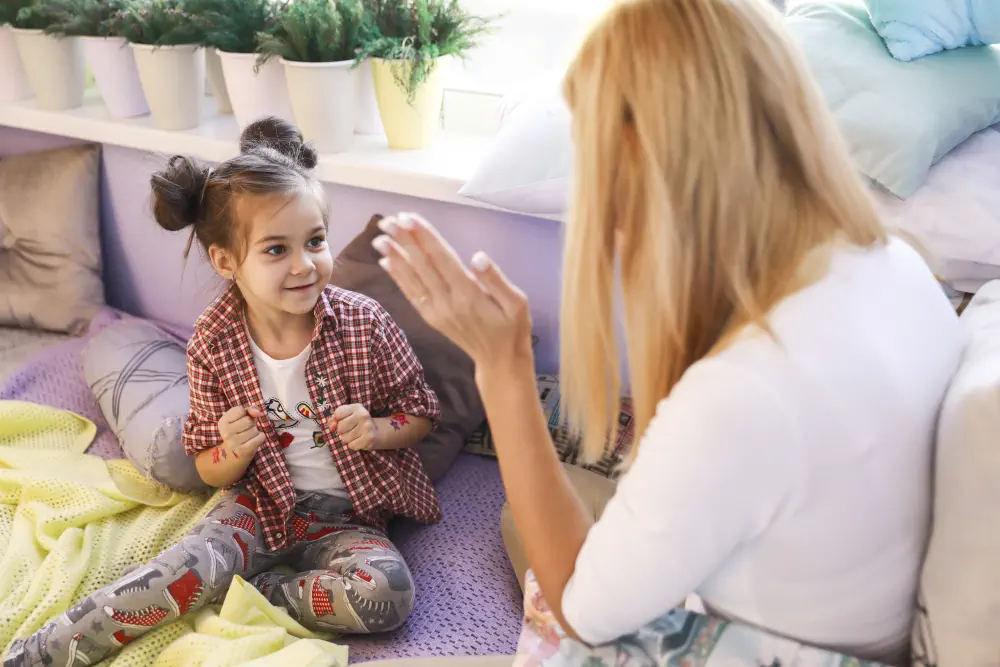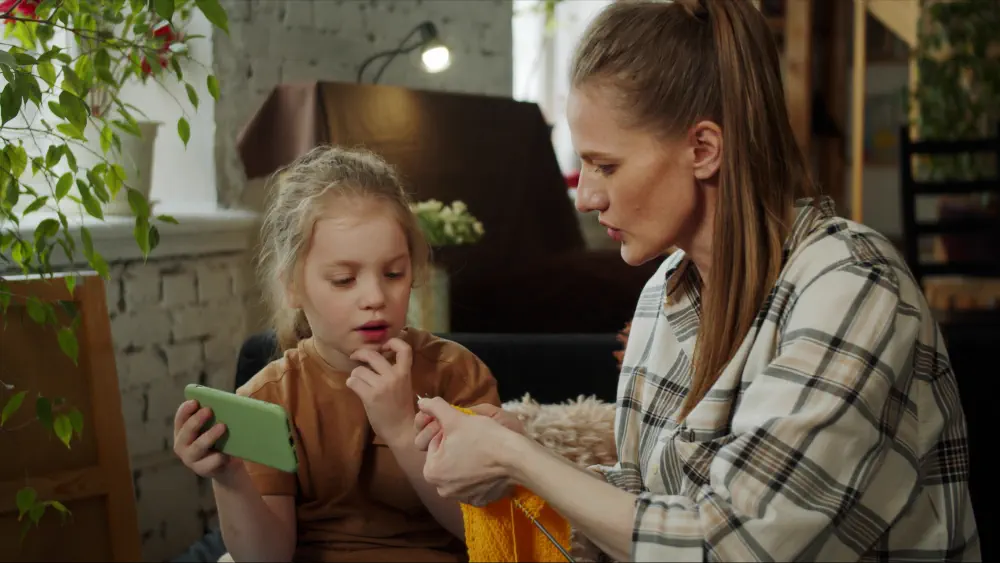We offer medical detox and multiple addiction treatment options in our
luxury treatment centres in Port Hope, Cobourg, and Ottawa.
How To Talk To Your Kids About Drugs: A Parent’s Guide
Back-to-school season brings familiar worries. Backpacks, lunch money, new teachers. But there's something else nagging at parents more than ever. The opioid crisis has emergency rooms seeing more teenagers. Your child will encounter drugs. Period. Most parents dread this conversation. What if I mess up? What if they get curious? These fears keep families silent when they should be talking. Smart drug education doesn't rely on perfect timing or scare tactics.

Key Takeaways
- Age trumps timing - Third-graders need safety rules, high schoolers need real strategies for peer pressure
- Truth beats terror - Exaggerated warnings kill trust faster than drugs damage brains
- Three categories exist - Use, misuse, and abuse each need different responses
- Home matters most - Family bonds beat any school program
Understanding Substance Use, Misuse, and Abuse
Parents lump all drug behavior into one scary bucket. This doesn't help kids navigate reality.
Substance use follows directions. Your daughter takes ADHD meds each morning. Your son uses his inhaler during attacks. Adults drink coffee. Nothing dangerous here when done right.
Substance misuse breaks rules without creating dependence. Taking three painkillers instead of one. Drinking cough syrup for relaxation rather than treating coughs. Exceeds recommendations but hasn't become compulsive.
Substance abuse damages life through patterns. Regular overuse develops. The person can't function without it. Work suffers. Relationships crumble. This is addiction territory.
Why does this matter? Kids encounter all three types. The friend sharing anxiety meds before tests shows misuse, not abuse. Your teen needs to spot these differences to make smart choices and help troubled friends.
Children who grasp these categories ask better questions about drugs. They report concerning friend behavior more readily. Warning signs get recognized before problems explode.
How Should I Talk to My 8- to 12-Year-Old About Drugs?
Elementary kids think in black and white. Abstract concepts like addiction don't register. They need simple rules they can follow today.
Start with medicine safety. Kids already take medicine sometimes. Build from there. "Remember how Mom gives you exact amounts of children's Tylenol for fevers? All medicines work that way. Wrong amounts or someone else's medicine can make you very sick."
Household rules that work:
- Never take pills you find
- Only accept medicine from parents or school nurses
- Tell trusted adults if someone offers unknown substances
- Ask questions when confused
Use their natural curiosity. Eight to twelve-year-olds ask endless questions about everything. Encourage drug questions rather than shutting them down. "I heard kids talking about smoking something at recess. What does that mean?" Answer simply. Ask what else they want to know.
Practice scenarios during car rides. "What would you do if you found pills in the school bathroom?" Let them think. Praise smart choices like telling teachers or leaving immediately.

How Should I Talk to My Teen About Drugs?
Teenagers live differently than younger children. Their Prefrontal Cortex won't finish developing until mid-twenties. They feel invincible while worrying about everything.
Start with their knowledge. "What drug education have you gotten at school?" Listen without immediately correcting misconceptions. Understanding their baseline helps you fill gaps rather than repeat information.
Questions about drugs that open dialogue:
- "Does school drug education seem realistic to you?"
- "Have you been around kids drinking or using drugs?"
- "What would you do if someone offered you something at a party?"
Address social reality head-on. Pretending teens don't encounter drugs insults their intelligence. They've seen classmates vaping in bathrooms. They know which parties have alcohol. Some have friends smoking marijuana regularly.
Discuss specific strategies for real situations. Practice saying no without alienating friends. "I'm driving tonight." "I'm on medication." "Early morning tomorrow." Help them develop authentic responses.
Teens care about immediate consequences. College applications, sports eligibility, driving privileges matter more than health warnings. Connect concerns to things they value right now.
5 Universal Tips on How to Talk to Your Child About Drugs
These work regardless of age, though you'll adjust language accordingly.
1. Timing beats planning. Skip formal drug talks. Watch for natural openings. News stories about overdoses. TV shows featuring substance use. Questions during regular conversations feel less intimidating.
2. Ask more than you answer. "What do you think?" becomes your power tool. Children reveal real concerns when you listen first. Their questions about drugs show what actually worries them.
3. Admit benefits people get from drugs. This makes parents uncomfortable. But kids need honest answers about why people use substances. Friends seem happier drinking. Students appear confident after smoking marijuana. Ignoring observed benefits destroys credibility instantly.
4. Share appropriate experiences. You don't need confessing every past mistake. But acknowledging similar choices helps children see you as real rather than a lecturing authority. "Kids pressured me to try things too" opens dialogue better than "Just say no."
5. Make it ongoing. Drug conversations should happen regularly, like school discussions. Comment on news. Ask about friends' experiences. Check in after parties. Normalize these talks so children feel comfortable bringing up concerns.
How Can I Help Keep My Kids Safe From Drugs?
Prevention means building protective factors while reducing environmental risks. Research shows certain family practices dramatically lower substance abuse rates.
| Protective Factors | Risk Factors |
| Strong family relationships | Family addiction history |
| Clear expectations | Inconsistent discipline |
| Regular family activities | Social isolation |
| Academic success | Academic struggles |
| Healthy peer relationships | Drug-using peer groups |
| Sports/activity involvement | Lack of supervision |
| Good parent communication | Mental health issues |
| Strong self-esteem | Low self-worth |
Build genuine connections. Children with close family bonds resist peer pressure better. Show genuine interest in their thoughts and daily experiences. One-on-one time creates natural conversation opportunities.
Monitor without becoming a detective. Know where children spend time, their friends, and free-time activities. This should feel supportive, not invasive. Build relationships with other parents for consistent expectations.
Modern monitoring approaches:
- Location sharing for safety, not surveillance
- Age-appropriate social media connections
- Regular online activity check-ins
- Open-door bedroom policies
Address mental health early. Many begin using drugs for depression, anxiety, or trauma. Watch for mood changes, social withdrawal, declining grades. Seek help early rather than hoping problems disappear.

The Canadian Centre for Addiction provides family resources for substance abuse concerns. Early intervention prevents minor issues becoming serious addictions requiring Inpatient Treatment.
Understanding how to explain addiction to a child gets simpler focusing on brain changes rather than moral failures. Addiction represents medical conditions affecting brain responses to substances. Some brains become dependent easier, like developing diabetes or allergies.
Create family culture discouraging drug use. This happens through daily choices, not formal rules. Model healthy stress management. Show children how handling disappointment without substances. Demonstrate difficult emotions are temporary.
Family traditions building identity:
- Weekly phone-free dinners
- Annual camping trips
- Holiday memory-making traditions
- Regular community service together
Children strongly connected to family values resist outside pressures better. They have something meaningful protecting.
The benefits of avoiding drugs extend beyond preventing addiction. Drug-free teenagers maintain better grades, develop stronger friendships, learn healthier coping mechanisms creating positive cycles supporting smart choices throughout life.
FAQ
When should I start talking to kids about drugs?
Begin basic safety conversations around 8-10 with medicine rules and stranger concepts. Build complexity as children mature through their teens.
How do children of addicts behave?
Children from addiction-affected families often show anxiety, depression, academic problems, or behavioral issues. They may assume adult responsibilities early or struggle with trust.
What are the most important benefits of avoiding drugs?
Drug-free children maintain better health, achieve higher academic performance, develop stronger relationships, and learn effective coping strategies benefiting them throughout adulthood.
How can parents recognize early warning signs of drug use?
Watch for sudden behavior changes, academic performance shifts, new friend groups, sleep schedule disruptions, or mood instability. Physical signs include bloodshot eyes, unusual odors, and unexplained items.
What should I do if I discover my child is using drugs?
Stay calm. Avoid angry confrontations, shutting down communication. Focus on understanding their motivations and seek professional guidance if the situation exceeds your comfort handling independently.





